|
|
|
Sort Order |
|
|
|
Items / Page
|
|
|
|
|
|
|
| Srl | Item |
| 1 |
ID:
158020
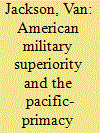

|
|
|
|
|
| Summary/Abstract |
Does the United States seek primacy in Asia? The belief that it does is widespread and long-standing. Scholars and pundits in the United States and around the world routinely reference the condition of primacy in Asia – defined here as unrivalled influence over strategic life1 – as either a means or an end of US strategy, or both. But is it accurate? This matters as much more than a semantic dispute. The presumption of Asian primacy features prominently in debates about US grand strategy. Some see it as a normative good for the United States, the only adequate means for securing US interests abroad.2 Others give the unsustainability of a condition of primacy as reason to favour retrenchment from the United States’ international commitments.3
|
|
|
|
|
|
|
|
|
|
|
|
|
|
|
|
| 2 |
ID:
158024
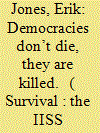

|
|
|
|
|
| Summary/Abstract |
The death of American democracy is a whodunnit, even if the crime is still in progress and the outcome is uncertain. There are many suspects, each of whom has motive, means and opportunity. Donald Trump, his allies and his enablers are at the top of the list. But populists like Trump have been around a long time, so it is also worth asking who fell asleep on the watch. There, perhaps, we should point a finger at political parties – democracy’s gatekeepers. Somehow the Republican Party seems to have lost that critical function. As we look more closely at who did what and when, we uncover a gallery of rogues stretching back to the Nixon administration (if not earlier) who conspired to bend political institutions to their own designs. If Republicans let a few populists like Trump in through the back door, that was more by self-distraction than intent.
|
|
|
|
|
|
|
|
|
|
|
|
|
|
|
|
| 3 |
ID:
158022
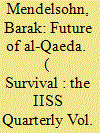

|
|
|
|
|
| Summary/Abstract |
Despite its failure to mount a spectacular attack on the US homeland in 16 years, interest in al-Qaeda is back in fashion. This is not entirely surprising: the United States’ account with the group responsible for the 9/11 attacks will remain open as long as al-Qaeda exists. For its part, al-Qaeda still proclaims its hatred of the United States, views the fight against the US as a necessary step toward the attainment of its political and strategic objectives, maintains a forward presence in Syria and actively plots to attack American interests.
|
|
|
|
|
|
|
|
|
|
|
|
|
|
|
|
| 4 |
ID:
158021


|
|
|
|
|
| Summary/Abstract |
Iran and Saudi Arabia appear fated to be rivals. Their controlled competition in the 1970s, organised around common threats, gave way to intense rivalry after the Iranian Revolution of 1979. Over the ensuing four decades there have been ups and downs, but the constant feature has been competition. The 2011 Arab Spring added a new dimension to previous disputes, turning the traditional Iran–Saudi rivalry into a fierce regional confrontation.
|
|
|
|
|
|
|
|
|
|
|
|
|
|
|
|
| 5 |
ID:
158016
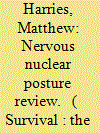

|
|
|
|
|
| Summary/Abstract |
The 2018 US Nuclear Posture Review (NPR), released on 2 February, contains troubling recommendations to broaden the role of nuclear weapons in American strategy, but omits more radical options that some observers had anticipated. Overall, it feels more swamp than Trump – that is, it gives the impression of having been written by informed professionals within the mainstream of US national-security thinking, albeit clearly at the hawkish end of that spectrum.
|
|
|
|
|
|
|
|
|
|
|
|
|
|
|
|
| 6 |
ID:
158017
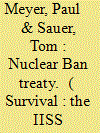

|
|
|
|
|
| Summary/Abstract |
Future historians may record summer 2017 as the beginning of the end of the nuclear age. On 7 July 2017, 122 states adopted the text of a legally binding international treaty that provides for a comprehensive ban on nuclear weapons (or ‘ban treaty’).1 The treaty was opened for signature on 20 September 2017, and at the time of writing, 56 states had signed and five had ratified.
|
|
|
|
|
|
|
|
|
|
|
|
|
|
|
|
| 7 |
ID:
158018


|
|
|
|
|
| Summary/Abstract |
2018 marks the seventh year of a civil war in Syria which, from its very beginning, has been marred by the use of chemical weapons (CW). The Syrian regime – responsible for the vast majority of an estimated 150 attacks or more – has faced little or no penalty for its crimes. The attacks are blatant violations of the Chemical Weapons Convention (CWC), multiple United Nations resolutions and a host of international laws and protocols.
|
|
|
|
|
|
|
|
|
|
|
|
|
|
|
|
| 8 |
ID:
158014
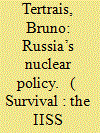

|
|
|
|
|
| Summary/Abstract |
The dominant narrative about Russia’s nuclear weapons in Western strategic literature since the beginning of the century has been something like this: Russia’s doctrine of ‘escalate to de-escalate’, and its large-scale military exercises, show that Moscow is getting ready to use low-yield, theatre nuclear weapons to stop NATO from defeating Russia’s forces, or to coerce the Atlantic Alliance and end a conflict on terms favourable to Russia.
|
|
|
|
|
|
|
|
|
|
|
|
|
|
|
|
| 9 |
ID:
158023


|
|
|
|
|
| Summary/Abstract |
As the UK and EU enter the second phase of Brexit negotiations, during which their future relationship should be defined, questions over UK–EU cooperation in the security field are becoming more salient. Indeed, the UK and EU are reportedly seeking to fast-track a security and defence deal to allow a move to a new relationship straight after the UK’s departure from the union.1 EU security cooperation takes many forms, including joint action on illegal immigration and terrorism, and policies on sanctions and defence. Whereas most security areas will be governed by new or existing frameworks, such as NATO and various bilateral arrangements, the future of joint work on sanctions faces substantial risk.
|
|
|
|
|
|
|
|
|
|
|
|
|
|
|
|
| 10 |
ID:
158019


|
|
|
|
|
| Summary/Abstract |
Smart cities that capitalise on the power of digital technology to improve the urban experience are multiplying across the globe. While these cities offer a promising solution to many contemporary urban challenges, they are also ushering in a new age of digital insecurity in which cyber-security loopholes can be exploited by malicious hackers to wreak substantial digital and physical damage. To counteract this threat, cities need to identify their digital-security gaps and introduce a risk-management approach that puts priority on key city assets and services for protection. What is more, because cyber attacks tend to be transboundary in nature, smart cities around the world must work in partnership to fend off such attacks.
|
|
|
|
|
|
|
|
|
|
|
|
|
|
|
|
| 11 |
ID:
158015


|
|
|
|
|
| Summary/Abstract |
Reactions to the 2018 US Nuclear Posture Review (NPR) have ranged from highlighting its continuity with the views of the Obama administration,1 on the one hand, to warning that it is ‘hastening the rise of a more dangerous world’ by increasing reliance on nuclear weapons, on the other.2 One analyst, somewhere in between these two poles, acknowledges a continuity of doctrine in practical terms, but argues that the ‘tone’ and spirit of US nuclear policy has changed.
|
|
|
|
|
|
|
|
|
|
|
|
|
|
|
|
| 12 |
ID:
158013
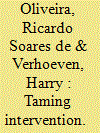

|
|
|
|
|
| Summary/Abstract |
Military intervention in weak states by their more powerful peers is one of the great constants in the history of international relations, and is closely related to the question of state survival. In an anarchical international system characterised by a scarcity of resources, how do feeble polities manage threats to their sovereignty? African states in particular have been subject to continual interventions by outside forces, whether those of multilateral organisations such as NATO and the EU, or of individual great powers. This trend has only increased in the last two decades, owing, inter alia, to the ‘war on terror’, deepening worries over a nexus between security and migration, and the seemingly growing fragmentation of authority in numerous African states. The continent is the subject of two-thirds of UN Security Council discussions on armed conflict and the theatre of more ongoing UN peacekeeping operations than the remaining world regions combined. Yet it is striking that African states have not only maintained independent statehood and resisted regime change, but in recent years have both clamoured for extra-regional intervention and become avid inter-regional interveners themselves. A continent that might once have been described as the world’s most sovereigntist has thus, intriguingly, become highly tolerant, and even encouraging, of military intervention. Why?
|
|
|
|
|
|
|
|
|
|
|
|
|
|
|
|
|
|
|
|
|